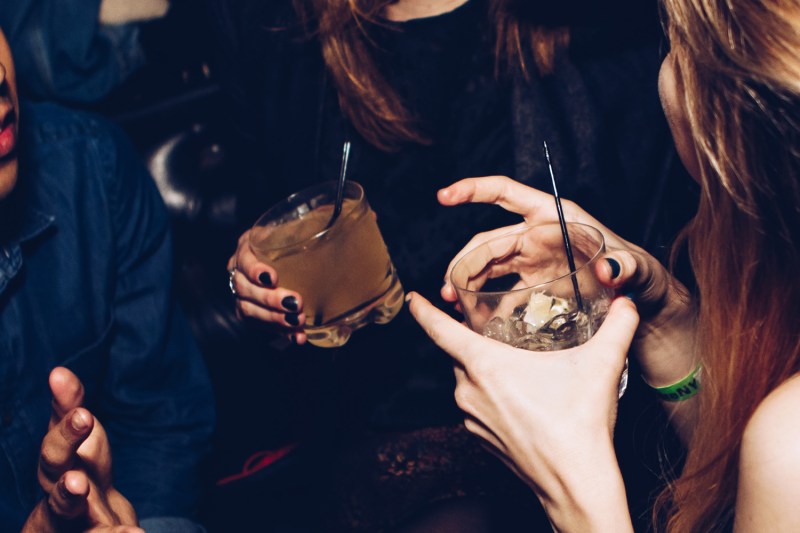
Booze is woven into the lexicon of American music, most notably in country form. It’s beautifully referenced, used as a symbol, lionized, loathed, and everything in between. And it’s done so to the tune of more than just steely twang, from the shy and melodic introspection of indie to the plugged-in bluesy leanings of boogie rock.
The stereotypical rock star is a drink-toting, tight-pants-wearing stack of leather, tattoos, and hair. They leave a trail of empty bottles, cart Dixie cups on stage, and buy rounds on record label tabs. But certain musicians go a step further, inviting the many highs and lows associated with alcohol into their songs through riveting lyrics.
Morphine
One of the best and most unique acts of the 90s was equally gloomy. Adding to the band’s already emotive sound were Morphine’s major pillars, the saxophone and extreme baritone vocals. The late Mark Sandman and Co. turned out some of the moodiest college radio sounds of the late 20th century.
Sandman had an eloquent way of tackling drugs in general (“someday, there’ll be a cure for pain/that’s the day, I throw my drugs away”). Listening to Morphine, you can’t help but pour yourself a glass of wine and feel all of the noir feelings.
Elliott Smith
The late Elliott Smith was easily one of the greatest singer-songwriters of his generation. Fame ultimately broke him down and the artist had his bouts with excessive drinking throughout. One night, Smith would perform the most gorgeous set you’ve ever heard. The next, he’d last three songs and storm off the stage in tears, half-drunk. The immensely gifted songsmith had his demons.
“Between the Bars” is a prime example, touching on the escapism and veil a good bender can provide (“drink up with me now and forget all about/the pressure of days, do what I say”). In a heartbreaking tribute to Portland of sorts (Old Portland, especially, where he lived for many years), Smith references a drunk horn player as part of the parade. It’s a spectacle that he finds amusing but also painfully familiar and the two characters become one as the achingly beautiful song comes to a close.
Cold War Kids
On the Long Beach band’s best album, Robbers & Cowards, Cold War Kids tells a boozy story via the track “We Used to Vacation.” It’s a sobering tale about alcoholism and riding sauce as a buoy while trying to be a noble family man. It’s an American tale anybody with family and access to a minibar can understand, told through some fantastic indie-rock.
Silver Jews
As quotable as they come, David Berman of the Silver Jews tended to be near a drink of some kind. Gin and beer seeped into his lyrics, with poetically explained the trials and tribulations of life in America. From “Horseleg Swastikas” to “Advice to a Graduate,” a drink stood near. “Your third drink will lead you astray,” he warned in the latter song, though we’ve all been there. “Wandering down the backstreets of the world.”
Jeff Buckley
Credit to the great Nina Simone for elevating the song and to Jeff Buckley for immortalizing it. “Lilac Wine” takes a romantic view of wine and inebriation, a journey set against the fruit-producing tree and winemaking process itself. “Lilac wine is sweet and heady, like my love,” he sings. “Lilac wine, I feel unsteady, like my love.” Brilliant.
George Thorogood
Boogie-rocker George Thorogood likes to multi-task. His classic “One Bourbon, One Scotch, One Beer” takes a lighter look at a real bad day. He sits at the bar, enjoying his multitude of beverages and forgetting about work and spouse troubles. “Gonna get high man listen to me,” he says. “One drink ain’t enough man you better make it three. I want to get drunk, I’m gonna make it real clear. I want one bourbon, one scotch and one beer.”
Cat Power
Shout-outs to booze aren’t just a sad man’s game. Chan Marshall, AKA Cat Power, has had an intimate relationship with the stuff, using it as a coping mechanism for the depression she experienced several years back. “Lived in Bars” from the incredible The Greatest record captures it all. “We’ve lived in bars and danced on the tables,” she sings. “Hotels, trains, ships that sail, we swim with sharks and fly with airplanes in the air.”


